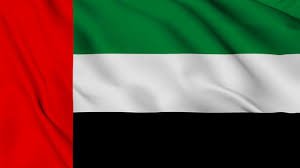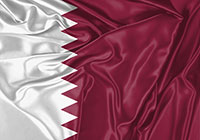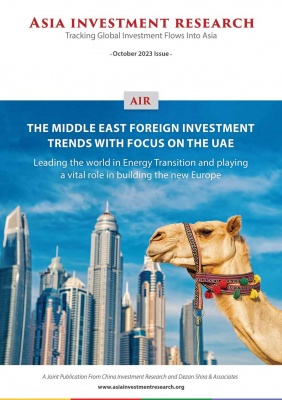The Gulf Cooperation Council Countries To Replace The United States As The Primary Source Of China FDI
China is set to receive US$1-2 trillion in investments from top sovereign funds in the Middle East by 2030 as they look to pivot to Asia amid a rapid rise in their investment capital, Hong Kong Stock Exchange CEO Nicolas Aguzin has said.
Gulf Cooperation Council (GCC) state-controlled wealth funds currently have about US$4 trillion in investment capital available and only a small portion of that – approximately 1-2% – is being invested in Asia, particularly China.
This investment capital is expected to grow to about US$10 trillion by the end of this decade and “we estimate somewhere between 10 – 20 % will be invested in China”, said Mr Aguzin, a former JP Morgan banker. “Think about what that means. That’s about US$1 – US$2 trillion that will be reallocated in investments in that part of the world.”
The GCC countries include Bahrain, Kuwait, Oman, Qatar, Saudi Arabia and UAE.
Sovereign funds that hold significant stakes in publicly listed companies across the world have started pivoting to the broader Asia region, particularly to China as their economic growth continues to outpace the global average.
China is also home to one of the biggest pools of investment capital: Chinese domestic savings, both retail and institutional, which are growing at a rapid pace. That pool of investment has so far been focused primarily on opportunities in China’s domestic market.
However, with China being the main trading partner of about 140 economies in the world, this capital will start to move out of the country and flow to eastern and western markets, which also bodes well for trade in the Middle East, Aguzin said. “We will start to see more of that capital coming out of the mainland and going internationally.” he said.
Examples of GCC funding into China in Q3 this year (2023) include:
Saudi Arabia

Five agreements were signed including one with the largest disclosed value in Q1:
- Saudi Aramco signed agreements with Hangzhou-based Rongsheng Petrochemical to acquire a 10% interest in Rongsheng Petrochemical of for US$3.6 billion.
- Saudi Aramco announced a partnership with NORINCO Group and Panjin Xincheng Industrial Group to build an integrated refinery and petrochemical complex in Liaoning province. The complex will be developed by the JV set up by the three companies, with NORINCO holding 51% and Saudi Aramco taking 30%.
- Saudi Aramco agreed to become a 20% stakeholder in a lower-emission tech powertrain JV with Geely and Renault (1st first major oil producer to invest in the automotive business).
- Saudi Aramco also signed a MOU with the government of Guangdong province to enter into cooperation in energy, research and development, industrial projects, finance and talent exchange.
- VSPN announced a US$265 million investment from Savvy Games Group, (PIF) becoming the largest shareholder. VSPN has become a leading global esports operator and hosted a series of gaming esports tournaments.
UAE

Emirates Airlines have agreed to increase its China operations in response to strong travel demand, boosting connectivity to its gateways; Guangzhou, Shanghai and Beijing.
Qatar

Oricell Therapeutics, a China-based innovative pharmaceutical company committed to the development of tumor cellular immunotherapeutics, announced the close of a US$45 million Series B1 investment round after the completion of a US$125 million Series B fund-raise in July 2022. This round was led global investors RTW Investments and QIA, with participation from existing investors, including Qiming Venture Partners and C&D Emerging Industry Equity Investment.
Chris Devonshire-Ellis of Dezan Shira & Associates says: “This indicates a shift in global financing flows to China, with the Arab world now actively competing with the United States in funnelling investments into China. Due to political tensions with the US, China has also been looking at opening up alternative sources of funding.”
“China requires about US$2 trillion in financing to power its own investments and national development – the GCC appears to be the answer. To some extent, the GCC is also a beneficiary of the current geopolitical instability as oil prices are rising. At present a barrel of crude oil sells for about US$100 – a growing number of analysts feel this has the potential to rise to US$150 over the coming months, providing additional financing for the Gulf nations and making it easier for them to allocate investments into Asia.”
About Us
Dezan Shira & Associates assist foreign investors into Asia and have done since 1992, having 40 regional offices, including Dubai. For assistance in the Middle East markets please email us at dubai@dezshira.com or visit us at www.dezshira.com Please also refer to our Middle East research studies below.
Related Reading
 An Introduction to Doing Business in Dubai 2023
An Introduction to Doing Business in Dubai 2023 The Middle East Foreign Investment Trends with Focus on the UAE
The Middle East Foreign Investment Trends with Focus on the UAE
About Us
Middle East Briefing is one of five regional publications under the Asia Briefing brand. It is supported by Dezan Shira & Associates, a pan-Asia, multi-disciplinary professional services firm that assists foreign investors throughout Asia, including through offices in Dubai (UAE), China, India, Vietnam, Singapore, Indonesia, Italy, Germany, and USA. We also have partner firms in Malaysia, Bangladesh, the Philippines, Thailand, and Australia.
For support with establishing a business in the Middle East, or for assistance in analyzing and entering markets elsewhere in Asia, please contact us at dubai@dezshira.com or visit us at www.dezshira.com. To subscribe for content products from the Middle East Briefing, please click here.
- Previous Article 8th UNCTAD World Investment Forum Opens In Abu Dhabi
- Next Article Ras Al Khaimah Launches Digital Economic Free Trade Zone


